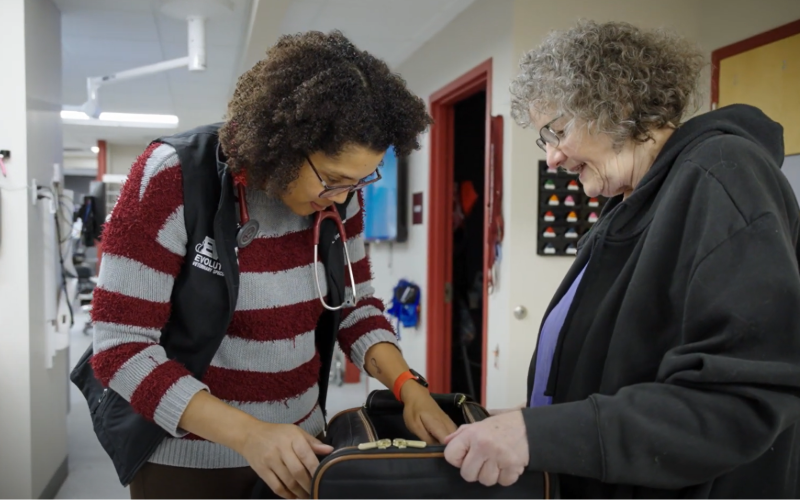How to Tell if Your Pet Needs an Ultrasound For Dogs}
Wiki Article
What You Required to Learn About Veterinary Services: A Summary of Diagnostic Devices and Procedures
Veterinary solutions play a crucial function in maintaining the wellness of pet dogs. Normal examinations can reveal surprise wellness concerns beforehand. Numerous diagnostic tools and treatments, such as blood tests and imaging strategies, supply crucial understandings right into an animal's well-being. Understanding these methods is vital for animal proprietors. What certain analysis procedures are most frequently utilized, and how can they affect an animal's therapy plan?Relevance of Regular Veterinary Check-Ups
While numerous animal proprietors may underestimate the significance of regular veterinary examinations, these visits are crucial for preserving a pet's general wellness. Routine check outs to the veterinarian enable very early detection of potential health concerns prior to they escalate into serious troubles. Regular examinations typically consist of vaccinations, which are necessary for preventing transmittable conditions that might badly affect a pet's wellness. In addition, these visits provide an opportunity for vets to assess the animal's weight, oral wellness, and general condition, making sure that the pet is prospering. During these gos to, pet dog owners can also get useful guidance on diet plan, exercise, and preventative care tailored to their particular pet's needs.Usual Diagnostic Treatments in Veterinary Medication
In vet medication, accurate diagnosis is necessary for effective therapy. Typical analysis procedures include blood testing strategies, progressed imaging innovations, and urinalysis, each playing a substantial duty in determining health and wellness problems. Comprehending these techniques enhances the ability to supply ideal care for animal people.Blood Evaluating Strategies
Blood screening methods act as necessary diagnostic tools in veterinary medicine, making it possible for vets to evaluate the health of pets properly. These techniques include collecting blood examples to evaluate various elements, such as white and red blood cells, platelets, and biochemical pens. Typical tests include total blood matters (CBC), which examine total health and wellness and detect infections, and biochemical panels, which evaluate body organ feature and metabolic standing. Furthermore, serological examinations can recognize specific illness through antibody discovery. Blood testing is minimally intrusive and provides essential information that helps in detecting problems, keeping an eye on health condition, and reviewing feedbacks to treatments. On the whole, these techniques play an important function in ensuring ideal care for animals and livestock alike.Imaging Technologies Utilized
Diagnostic imaging innovations are necessary tools in vet medicine, matching blood testing methods by offering visual understandings right into an animal's interior structures. Common imaging techniques consist of X-rays, which are useful for reviewing bone fractures and discovering international things, and ultrasound, which enables real-time visualization of soft tissues and organs. Magnetic resonance imaging (MRI) provides detailed photos of intricate physiological locations, especially in neurological evaluations. Computed tomography (CT) offers cross-sectional images, improving diagnostic precision for different problems. Each of these technologies help veterinarians in identifying diseases, preparing therapies, and checking healing. By integrating imaging innovations, veterinary specialists can better assess a pet's health and make informed decisions concerning their care.
Urinalysis and Diagnostics
Urinalysis functions as a crucial diagnostic device in veterinary medicine, supplying useful insights right into an animal's general wellness and assisting in the detection of different problems. This non-invasive procedure evaluates urine samples to examine kidney feature, hydration status, and metabolic disorders. Common parts checked out include specific gravity, pH degrees, sugar, proteins, and the visibility of blood or germs. Abnormal findings can indicate problems such as urinary tract infections, diabetic issues mellitus, or kidney illness. To improve diagnostic precision, urinalysis is usually executed in conjunction with other examinations, such as blood job and imaging studies. Early detection with urinalysis can cause timely treatments, improving the prognosis for many veterinary individuals. Therefore, it is a necessary element of complete veterinary treatment.Comprehending Blood Examinations and Lab Evaluation
Recognizing blood tests and lab analysis is important in veterinary medication as it assists in detecting numerous wellness conditions in pets. Different sorts of blood examinations provide important details concerning a pet's interior state, while translating lab results needs careful factor to consider of many elements. This section will certainly discover the kinds of blood tests available and the value of their results.Kinds of Blood Tests
Blood examinations play a vital duty in vet medicine, providing essential understandings into an animal's wellness status. Different kinds of blood examinations are utilized, each offering various purposes. Full blood counts (CBC) examine total health and wellness and find problems such as anemia or infection. Biochemical profiles evaluate body organ feature by determining electrolytes and enzymes, offering understandings right into metabolic health. Serological tests determine details antibodies or microorganisms, assisting in the medical diagnosis of infections or autoimmune diseases. Blood typing guarantees safe transfusions, while coagulation tests gauge the blood's ability to embolisms, crucial for surgeries. These examinations collectively improve medical diagnosis, treatment planning, and tracking of an animal's wellness, illustrating the importance of extensive laboratory evaluation in veterinary care.
Translating Lab Outcomes
A comprehensive evaluation of laboratory results is crucial for precise diagnosis and therapy in veterinary medication. Analyzing lab results requires an understanding of typical referral varieties and the value of variances. Blood tests can expose various health indicators, such as organ function, electrolyte equilibrium, and the visibility of infections. Veterinarians have to think about the whole scientific picture, consisting of the animal's history, checkup findings, and any kind of symptoms offered. Variants in outcomes may occur from variables such as age, type, and underlying wellness conditions. As a result, laboratory outcomes ought to not be watched in isolation however rather as component of an all-encompassing analysis strategy. Precise analysis enables tailored therapy plans and much better outcomes for vet people.Imaging Techniques: X-rays, Ultrasounds, and Beyond
Imaging methods are important devices in vet medicine, providing critical understandings right into the health and well-being of pets. Amongst the most generally utilized approaches are X-rays and ultrasounds. X-rays are indispensable for imagining bone structures, helping vets determine cracks, tumors, or international items. This approach is non-invasive and quick, making it perfect for urgent situations.Ultrasounds, on the other hand, use sound waves to develop pictures of soft cells and body organs. This method is especially useful for examining the heart, abdominal official source area, and reproductive organs, permitting vets to evaluate problems like fluid accumulation or body organ abnormalities.Beyond X-rays and ultrasounds, progressed imaging strategies such as computed tomography (CT) and magnetic vibration imaging (MRI) are significantly utilized in veterinary practice. These approaches provide detailed cross-sectional photos, enhancing the accuracy of diagnoses and therapy plans. Ultrasound For Dogs. Overall, imaging strategies play a crucial duty in ensuring reliable veterinary careThe Function of Biopsies in Diagnosing Pet Wellness Issues
Accuracy in diagnosing health issues in pets typically depends upon the use of biopsies, which give definitive info regarding cells irregularities. A biopsy involves the removal of a tiny sample of tissue for exam under a microscope, allowing veterinarians to determine various problems, including infections, tumors, and inflammatory diseases. This analysis tool is essential for comparing deadly and benign growths, directing therapy decisions, and assessing the extent of a condition.Biopsies can be performed making use of various techniques, such as needle ambition, incisional biopsies, or excisional biopsies, depending upon the area and kind of cells included. The selection of technique might affect recovery time and the quantity of cells accumulated. Inevitably, the information gleaned from a biopsy can lead to targeted treatments, improving results for family pets dealing with significant health difficulties. Veterinarians stress the importance of this treatment in achieving exact diagnoses and effective treatment plans.Advanced Diagnostic Tools: Endoscopy and CT Checks

Advanced diagnostic devices, such as endoscopy and CT scans, play a crucial function in contemporary vet medication, using non-invasive techniques to visualize interior frameworks and detect different conditions in animals. Endoscopy involves making use of an adaptable tube furnished with an electronic camera, enabling veterinarians to examine the gastrointestinal tract and breathing system directly. This technique can disclose abnormalities such as lumps, international bodies, or YOURURL.com inflammation, allowing targeted treatment plans.CT scans, on the other hand, make use of advanced imaging technology to produce detailed cross-sectional photos of the body (CT Scans For Dogs). This technique is particularly useful for evaluating facility structures like the brain, spine, and joints. By giving high-resolution pictures, CT scans assist vets in recognizing problems that might not be noticeable via conventional radiography. With each other, these innovative devices boost diagnostic precision, improve treatment end results, and ultimately add to better total pet health administration

Analyzing Test Results: What Animal Owners Should Know
Recognizing examination results can be a tough task for pet proprietors, particularly after innovative procedures like endoscopy and CT scans have been executed. Analyzing these outcomes requires an understanding of clinical terminology and a clear understanding of what the searchings for show about the animal's health and wellness. Vets frequently offer descriptions, but the complexity of the results can still lead to confusion.Pet owners must proactively participate in discussions with their veterinarians, asking inquiries to clarify any kind of unpredictabilities. It is important to comprehend typical versus uncommon outcomes and the effects for the animal's treatment strategy. Furthermore, acknowledging that some outcomes may need more screening or monitoring can assist proprietors remain notified regarding their pet dog's health and wellness journey. Inevitably, a joint technique between pet dog owners and vet specialists cultivates far better health and wellness results and boosts the general treatment experience for family pets.Often Asked Questions
Just how Do I Select the Right Vet Center for My Animal?
Picking the appropriate veterinary clinic involves looking into local alternatives, examining credentials, visiting facilities, and assessing personnel interactions (Board Certified Veterinary Cardiologist). Prioritizing suggestions from trusted resources can aid ensure the ideal care and setting for a pet's health needsWhat Should I Do if My Pet Dog Rejects to Go to the Veterinarian?
When a pet refuses to go to the vet, it's advisable to continue to be calm, use treats or toys to lure them, and take into consideration find more information setting up a home browse through if anxiety persists. Perseverance and positive reinforcement are essential.Exist Telehealth Options for Veterinary Services?
Telehealth choices for vet solutions are progressively available, allowing family pet owners to seek advice from with veterinarians from another location. These solutions make it possible for discussions concerning wellness concerns, advice on minor disorders, and follow-ups without needing to check out a facility.
Just how Typically Should My Animal Have Oral Exams?
The frequency of oral exams for family pets typically relies on their age and type. Normally, vets recommend yearly oral analyses, although some pet dogs might call for even more frequent check outs to keep ideal dental health.
What Are the Costs Related To Vet Diagnostics?
The prices connected with veterinary diagnostics can differ widely, commonly ranging from fundamental tests like blood job to sophisticated imaging techniques. Variables affecting expenses include the facility's place, tools utilized, and particular tests needed for each and every family pet. Veterinary solutions play an important function in keeping the wellness of family pets. While many family pet owners may ignore the importance of routine vet exams, these visits are vital for keeping a pet's total health. In addition, these visits give a possibility for veterinarians to analyze the animal's weight, oral health, and overall condition, making sure that the pet dog is flourishing. Accuracy in identifying health and wellness issues in family pets often pivots on the usage of biopsies, which offer clear-cut details concerning tissue abnormalities. In addition, acknowledging that some results might need additional testing or monitoring can aid owners remain educated regarding their animal's health trip.Report this wiki page